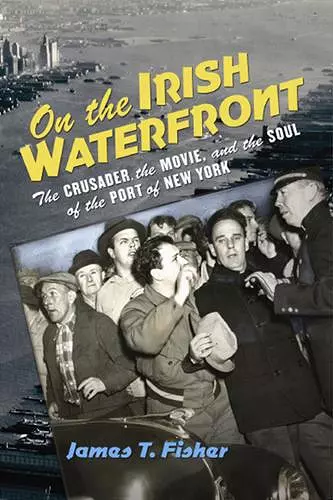On the Irish Waterfront
The Crusader, the Movie, and the Soul of the Port of New York
Format:Hardback
Publisher:Cornell University Press
Published:15th Sep '09
Currently unavailable, and unfortunately no date known when it will be back
This hardback is available in another edition too:
- Paperback£14.99(9780801476846)

Site of the world's busiest and most lucrative harbor throughout the first half of the twentieth century, the Port of New York was also the historic preserve of Irish American gangsters, politicians, longshoremen's union leaders, and powerful Roman Catholic pastors. This is the demimonde depicted to stunning effect in Elia Kazan's On the Waterfront (1954) and into which James T. Fisher takes readers in this remarkable and engaging historical account of the classic film's backstory.
Fisher introduces readers to the real "Father Pete Barry" featured in On the Waterfront, John M. "Pete" Corridan, a crusading priest committed to winning union democracy and social justice for the port's dockworkers and their families. A Jesuit labor school instructor, not a parish priest, Corridan was on but not of Manhattan's West Side Irish waterfront. His ferocious advocacy was resisted by the very men he sought to rescue from the violence and criminality that rendered the port "a jungle, an outlaw frontier," in the words of investigative reporter Malcolm Johnson. Driven off the waterfront, Corridan forged creative and spiritual alliances with men like Johnson and Budd Schulberg, the screenwriter who worked with Corridan for five years to turn Johnson's Pulitzer Prize-winning 1948 newspaper exposé into a movie. Fisher's detailed account of the waterfront priest's central role in the film's creation challenges standard views of the film as a post facto justification for Kazan and Schulberg's testimony as ex-communists before the House Committee on Un-American Activities.
On the Irish Waterfront is also a detailed social history of the New York/New Jersey waterfront, from the rise of Irish American entrepreneurs and political bosses during the World War I era to the mid-1950s, when the emergence of a revolutionary new mode of cargo-shipping signaled a radical reorganization of the port. This book explores the conflicts experienced and accommodations made by an insular Irish-Catholic community forced to adapt its economic, political, and religious lives to powerful forces of change both local and global in scope.
"Amply fills in the gaps among organized crimepublic officials and the street priests and Catholic hierarchy... also provides new insights into the long-debated claim that the film was intended by its screenwriterBudd Schulbergand its directorElia Kazanas a justification for their naming names of former Communist associates in their testimony before the House Un-American Activities Committee. He also clarifies the context of the famous utterance of Mayor Frank Hague of Jersey City: 'I am the law.' It turns out Mayor Hague was not flaunting his legendary power (he did not have to). He was intervening to get jobs for two truants rather than complying with legalities by sending them back to school.—Sam Roberts
* New York Times *Fisher captures with great clarity and encyclopedic detail the multilayered and fascinating history of the New York–New Jersey waterfront depicted in Elia Kazan's Oscar-winning 1954 film, On the Waterfront. Fisher's impeccable research delves into the real-life stories behind the characters, particularly Pete Corridan, the crusading Catholic priest who tried to reform the longshoremen's union and the recently deceased Budd Schulberg, who adapted Malcolm Johnson's 1949 Pulitzer Prize-winning 'Crime on the Waterfront' newspaper series for the screen. Fisher considers every angle of the story astutely and meticulously, setting it well in its mid-20th-century American context. This engaging narrative is essential reading for both labor historians and cinema buffs, plus anyone studying the waterfront, working-class and immigrant history, anticommunism, blacklisting, and the House Un-American Activities Committee.
* Library Journal *Fisher has spent more than a decade studying the culture, history and soul of the docks and piers that once lined the West Side of Manhattan and the riverfront of Jersey City and Hoboken. He also has researched the making of the film and the controversies it touched off long before it appeared in theaters in 1954. As a result, Fisher probably knows more about the waterfront than any living person who has not—as I assume he hasn't, although one never knows—stood in line at a shape-up. Fisher has poured all that knowledge into a glorious book that ought to change how movie critics view Schulberg's cinematic creation and how cultural historians interpret working-class culture in New York and New Jersey during the middle years of the 20th century.
-- Terry Golway * America *It may be hard for some to imagine an era when the waterfronts clustered around New York City constituted America's dominant commercial port. Yet as late as the 1950s the region's 900 piers—spread over Manhattan's West Side, South Brooklyn, and Hoboken and Jersey City, N.J.—handled more cargo than any port in the world. This is the setting for James T. Fisher's On the Irish Waterfront, a fascinating work of history that explores the rise of New York's commercial port from the early 1900s to the 1950s and the corruption that eventually infiltrated all levels of the cargo business, until a crusading priest helped to put a stop to it—and inspired a classic film along the way.
-- Edward T. O'Donnell * Wall Street Journ- Winner of Winner of the 2011 J. Owen Grundy History Award gi.
ISBN: 9780801448041
Dimensions: 235mm x 155mm x 28mm
Weight: 907g
392 pages